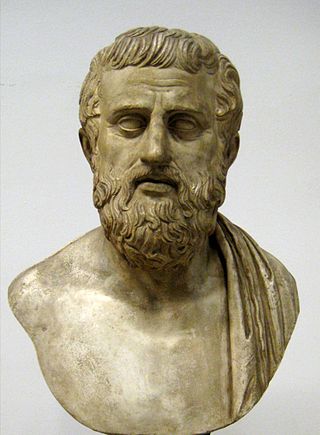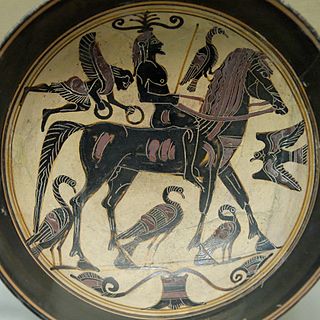Related Research Articles

Aristophanes was an Ancient Greek comic playwright from Athens and a poet of Old Attic Comedy. He wrote in total forty plays, of which eleven survive virtually complete today. These provide the most valuable examples of a genre of comic drama known as Old Comedy and are used to define it, along with fragments from dozens of lost plays by Aristophanes and his contemporaries.

Agathon was an Athenian tragic poet whose works have been lost. He is best known for his appearance in Plato's Symposium, which describes the banquet given to celebrate his obtaining a prize for his first tragedy at the Lenaia in 416. He is also a prominent character in Aristophanes' comedy the Thesmophoriazusae.

Aeschylus was an ancient Greek tragedian often described as the father of tragedy. Academic knowledge of the genre begins with his work, and understanding of earlier Greek tragedy is largely based on inferences made from reading his surviving plays. According to Aristotle, he expanded the number of characters in the theatre and allowed conflict among them. Formerly, characters interacted only with the chorus.

Euripides was a Greek tragedian of classical Athens. Along with Aeschylus and Sophocles, he is one of the three ancient Greek tragedians for whom any plays have survived in full. Some ancient scholars attributed ninety-five plays to him, but the Suda says it was ninety-two at most. Of these, eighteen or nineteen have survived more or less complete. There are many fragments of most of his other plays. More of his plays have survived intact than those of Aeschylus and Sophocles together, partly because his popularity grew as theirs declined—he became, in the Hellenistic Age, a cornerstone of ancient literary education, along with Homer, Demosthenes, and Menander.

Sophocles was an ancient Greek tragedian known as one of three from whom at least one play has survived in full. His first plays were written later than, or contemporary with, those of Aeschylus and earlier than, or contemporary with, those of Euripides. Sophocles wrote more than 120 plays, but only seven have survived in a complete form: Ajax, Antigone, Women of Trachis, Oedipus Rex, Electra, Philoctetes, and Oedipus at Colonus. For almost fifty years, Sophocles was the most celebrated playwright in the dramatic competitions of the city-state of Athens, which took place during the religious festivals of the Lenaea and the Dionysia. He competed in thirty competitions, won twenty-four, and was never judged lower than second place. Aeschylus won thirteen competitions and was sometimes defeated by Sophocles; Euripides won four.

In Greek mythology, Telephus was the son of Heracles and Auge, who was the daughter of king Aleus of Tegea. He was adopted by Teuthras, the king of Mysia, in Asia Minor, whom he succeeded as king. Telephus was wounded by Achilles when the Achaeans came to his kingdom on their way to sack Troy and bring Helen back to Sparta, and later healed by Achilles. He was the father of Eurypylus, who fought alongside the Trojans against the Greeks in the Trojan War. Telephus' story was popular in ancient Greek and Roman iconography and tragedy. Telephus' name and mythology were possibly derived from the Hittite god Telepinu.

The Birds is a comedy by the Ancient Greek playwright Aristophanes. It was performed in 414 BC at the City Dionysia in Athens where it won second place. It has been acclaimed by modern critics as a perfectly realized fantasy remarkable for its mimicry of birds and for the gaiety of its songs. Unlike the author's other early plays, it includes no direct mention of the Peloponnesian War and there are few references to Athenian politics, and yet it was staged not long after the commencement of the Sicilian Expedition, an ambitious military campaign that greatly increased Athenian commitment to the war effort. In spite of that, the play has many indirect references to Athenian political and social life. It is the longest of Aristophanes's surviving plays and yet it is a fairly conventional example of Old Comedy.

The Dionysia was a large festival in ancient Athens in honor of the god Dionysus, the central events of which were the theatrical performances of dramatic tragedies and, from 487 BC, comedies. It was the second-most important festival after the Panathenaia. The Dionysia actually consisted of two related festivals, the Rural Dionysia and the City Dionysia, which took place in different parts of the year. They were also an essential part of the Dionysian Mysteries.

The Frogs is a comedy written by the Ancient Greek playwright Aristophanes. It was performed at the Lenaia, one of the Festivals of Dionysus in Athens, in 405 BC and received first place.

Greek tragedy is one of the three principal theatrical genres from Ancient Greece and Greek inhabited Anatolia, along with comedy and the satyr play. It reached its most significant form in Athens in the 5th century BC, the works of which are sometimes called Attic tragedy.
Aristophanes of Byzantium was a Hellenistic Greek scholar, critic and grammarian, particularly renowned for his work in Homeric scholarship, but also for work on other classical authors such as Pindar and Hesiod. He soon moved to Alexandria and studied under Zenodotus, Callimachus, and Dionysius Iambus. He succeeded Eratosthenes as head librarian of the Library of Alexandria at the age of sixty. His students included Callistratus, Aristarchus of Samothrace, and perhaps Agallis. He was succeeded by Apollonius "The Classifier". Aristophanes' pupil, Aristarchus of Samothrace, would be the sixth head librarian at the Library of Alexandria.

Eupolis was an Athenian poet of the Old Comedy, who flourished during the time of the Peloponnesian War.
Cratinus was an Athenian comic poet of the Old Comedy.
Ion of Chios was a Greek writer, dramatist, lyric poet and philosopher. He was a contemporary of Aeschylus, Euripides and Sophocles. Of his many plays and poems only a few titles and fragments have survived. He also wrote some prose works, including a Pythagorean text, the Triagmos, of which a few fragments survive.
Choerilus was an Athenian tragic poet, who exhibited plays as early as 524 BC.
Phrynichus was a poet of the Old Attic comedy and a contemporary of Aristophanes. His first comedy was exhibited in 429 BC. He composed ten plays, of which the Recluse was exhibited at the City Dionysia in 414 along with the Birds of Aristophanes and gained the third prize. His Muses carried off the second prize at the Lenaia in 405, Aristophanes being first with the Frogs, in which he accuses Phrynichus of employing vulgar tricks to raise a laugh, of plagiarism and bad versification, and of lowbrow politics.
Philocles, was an Athenian tragic poet during the 5th century BC. Through his mother, Philopatho, he had three famous uncles: Aeschylus, the famous poet, Cynaegirus, hero of the battle of Marathon, and Ameinias, hero of the battle of Salamis. The Suda claims that Philocles was the father of the tragic playwright Morsimus, who was in turn the father of the tragedian Astydamas the Elder and was in his turn the father of the tragedian Astydamas the Younger.
References
- This article incorporates text from a publication now in the public domain : Chisholm, Hugh, ed. (1911). "Iophon". Encyclopædia Britannica . Vol. 14 (11th ed.). Cambridge University Press. p. 732. This work in turn cites: